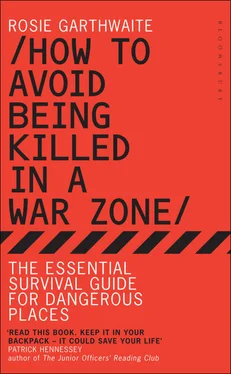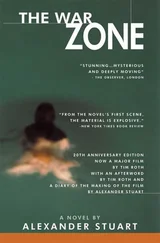/TAP INTO LOCAL KNOWLEDGE
The people you rely on from the area you are visiting will provide you with invaluable guidance on how to live your life in their world. You need to create a careful balance between respect for their opinion and faith in your own instincts.
Tom Coghlan spent five years in Kabul as a freelance reporter. He worked with Afghan journalists, who risked their lives on a daily basis to bring news from their country to the world. As Tom admits, over time and through the forest of a long-established beard, it is all too easy forget that you are only a visitor:
‘In 2006 I pushed my fixer to come with me into a market in the town of Maiwand, near Kandahar, which he said was full of Taliban. I wanted a vox pop [soundbites from the man on the street] on the day the British announced their deployment to neighbouring Helmand. (It seemed appropriate because the town had seen the great defeat of British troops in 1882, during the Second Afghan War.) I overruled my fixer’s misgivings and we went in there, though I persuaded two local militiamen to come too.
‘The first person we tried to speak to looked at us with incredulity and terror, and said his shop was now closed. Although I was dressed as an Afghan and trying to be discreet, few locals seemed to be fooled. We quickly found a crowd building around us. Our so-called bodyguards looked increasingly frightened. A man gestured at me and I tried to shake his hand. He continued to talk and gesture, as a look of increasing panic and indecision came into the eyes of our bodyguards. My fixer explained later that the man and other members of the crowd were trying to persuade the guards to shoot me as a spy and enemy of Muslims. The guards were unsure what to do, but my fixer was assertive and quick-witted, and dominated the indecision within the crowd for the crucial minute it took to pull me out of there.
‘The obvious lesson to draw from this is to think very carefully and really weigh the costs and benefits before you overrule local knowledge. It is, unfortunately, a lesson that I have learnt a few times.’
Zeina Khodr had the opposite struggle. It was sticking to her instincts and overriding the local advice that saved her life, she says.
‘Your life should be in your hands, no one else’s. Take advice, but also follow your instincts. My team and I were travelling to Helmand from Kandahar in late 2009 along a single-track road. We passed an area that was in the middle of an attack by the Taliban, and continued as far as we could until we came to a bridge that they blew up. There were three choices: go back on the single track; go off-road through the Taliban-controlled villages; or stay put. I said we should head back along the single track – we were all disguised, so there was no reason for them to suspect us. But after 500 metres, we saw Taliban fighters coming out of civilian homes. They were approaching the highway. A bus was stuck and there was a traffic jam. I said, “Don’t panic. Go forward.” The last thing I wanted was to go back and be a sitting duck. The rest of the team disagreed with me, reversing backwards until we had a police checkpoint full of drugged-up officers on one side, the bridge in front of us and the Taliban all around. We were stuck there for seven hours. We hadn’t brought water, so dehydration alone could have killed us. Reversing had been the wrong decision.
‘We called the office to ask for help from the US and British military. Then the NATO helicopters came and we realized we were at risk of being bombed. We looked the same as everyone else in our disguise. So we decided we had to leave. We waited for two or three cars from the village to come through and we followed them.’
I am a terrible driver. However, I have been on a few of the courses – driving in a hostile environment (mud) and driving on a skid board – and will tell you that under pressure I am sure we all become better drivers. The key is to remember just a few simple things.
• If you skid, turn the steering wheel into the skid rather than against it and this will bring it under control.
• Lower gears give you more control going up and down hills, and along muddy tracks.
• Listen to your car. It will tell you when to change gear and when to give up.
That’s it, really, the basics of driving in extreme conditions. Oh, and don’t drink and drive – that is one extreme condition that will not make you a better driver.
/PLANES, TRAINS AND AUTOMOBILES
When you are in a dangerous country there are several important matters you must address before you make a journey anywhere.
Decide whether to drive yourself or let others do it for you.This means choosing between hiring a car, employing a driver, or using buses and taxis. This needs to be thought about before arrival (see Local Transport).
If you opt for taxis, use the hotel’s service if possible, and build up a happy mutual relationship with tips. That way there is a limited number of people who know your movements and where you are staying. Also, the hotel will already have trusted drivers and know where they live.
If you opt for a local driver, make sure you choose the right one. An MSF volunteer told me about the checks they tried to make before hiring in Yemen: ‘Did they have any revenge issues? Were they from the right tribe for crossing the area? Would anyone take against one of them?’
Even if you have a driver you trust, you can never be sure about their friends. Shadi Alkasim, a freelance radio producer and journalist, recommends: ‘If you have an interpreter or driver, never give him accurate information about where you will be on the following day. For example, tell him you want to go tomorrow to such-and-such a place to cover the news there in the morning. But the next day tell him you have changed your mind and want to go to another place. Also change your route every day. Someone may be following you, and then you will be a very easy target.’
But even if you are using a local driver and relying on their know-how, you need to stay in control of your situation. If there is something you are not sure of or do not understand, always ask. As Ian Mackinnon told me:
‘When it all goes quiet you’re probably between the front lines in no man’s land. If the local populace has shut up shop, abandoned streets and there are no cars around, take heed. With colleagues from the Daily Telegraph and Independent , I was approaching the southern Gaza town of Rafah, surrounded by Israeli troops and tanks who were waging ferocious battles with Palestinian militants down the road that had already left more than a score dead. Our fixer, accompanied by a driver new to us, blithely announced that he knew how to thread a way through the tank cordon down some back roads through the sand dunes. To our dismay, he then proceeded to yack away on his mobile as we proceeded down ever-quieter roads, without even bothering to ask the one car coming the other way what lay down the lane ahead. Only then did my Telegraph colleague scream at our fixer to get off the phone and stop the car. He rightly expressed reservations despite the fixer’s none-too-reassuring assurances that he knew the way and all would be fine. But, spooked, the Telegraph man asked to be taken back to the main road and life, where he would find a taxi back to Gaza City. After lunch the rest of us decided we’d give Rafah a miss for that day too.
‘The Telegraph man’s decision illustrated, for me, the importance of being in control and doing what you feel comfortable with. Easier said than done when in a group of competitors each under their own pressures to reach the story. He made it back to Rafah without incident, as did we the following morning.’
Читать дальше




![Джонатан Димблби - Barbarossa - How Hitler Lost the War [calibre]](/books/385421/dzhonatan-dimblbi-barbarossa-how-hitler-lost-the-w-thumb.webp)







